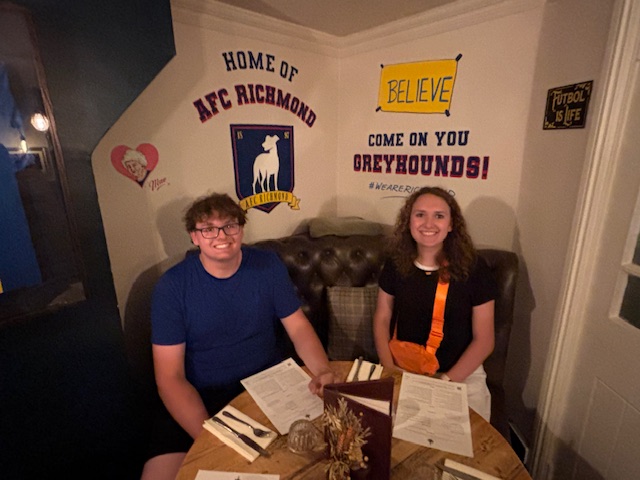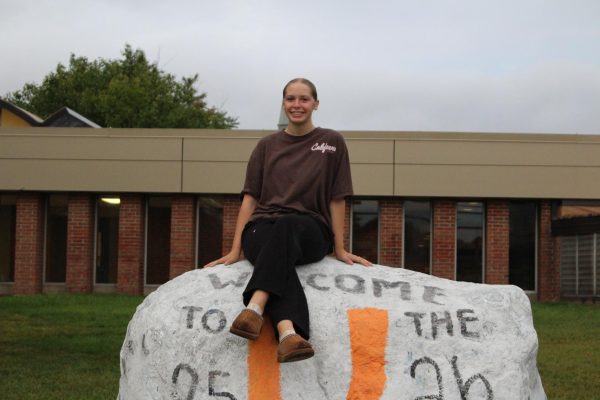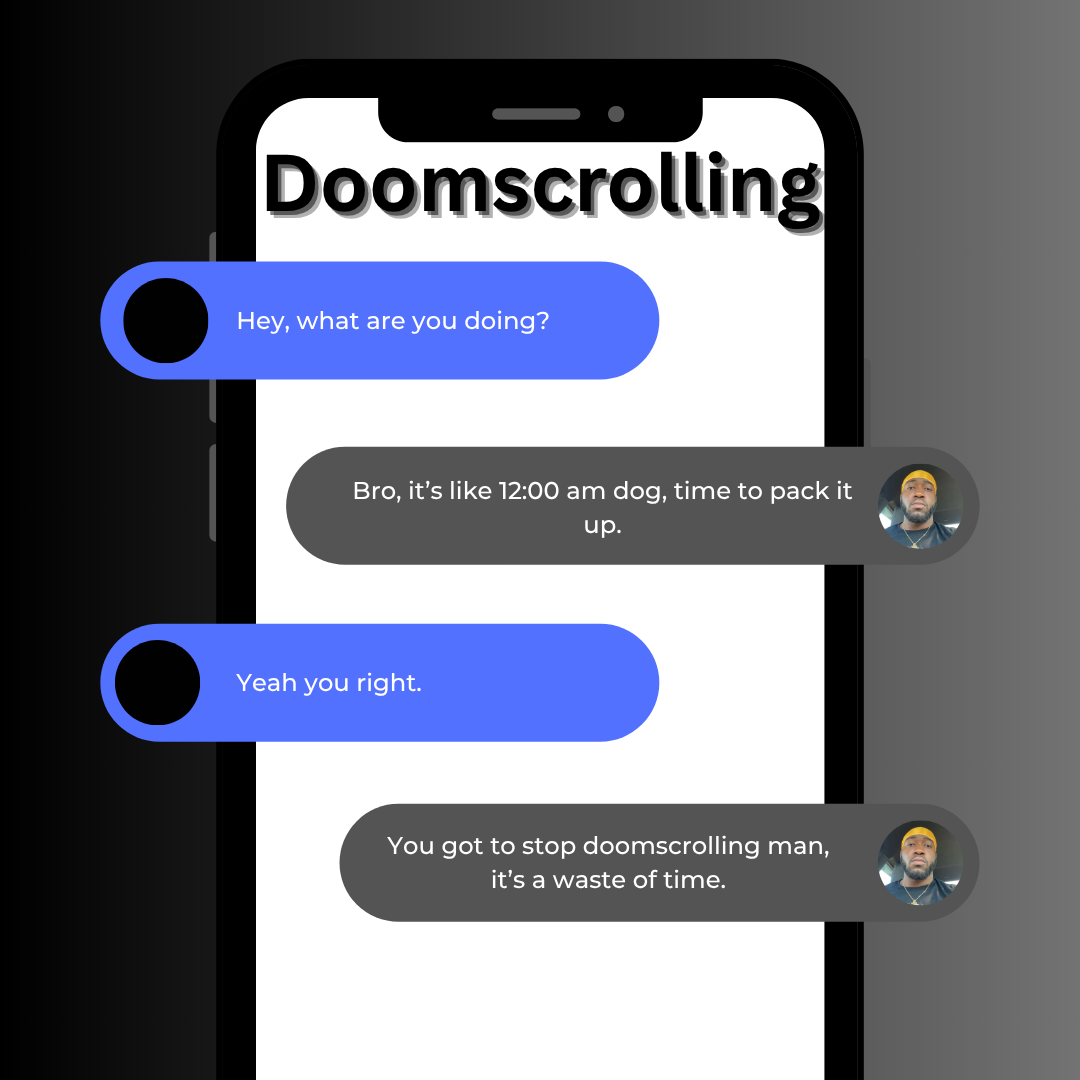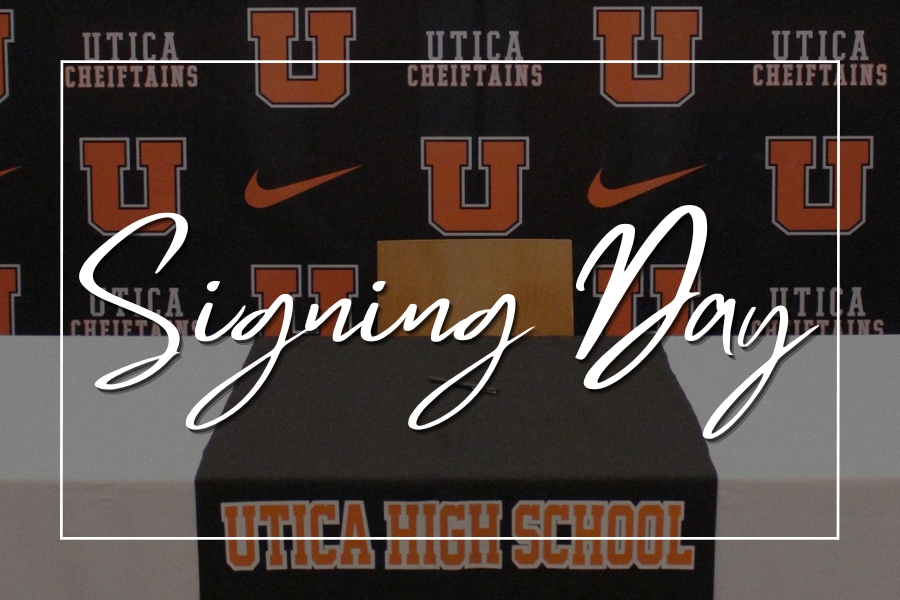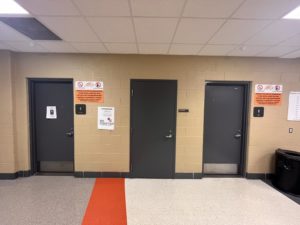Backstage Pass
Go behind the scenes of ‘Puffs’
December 17, 2019
Anyone who has been to a play or musical can agree – the actors put in a lot of work to make everything flow. However, what many people may not realize is the amount of hard work that has to be put into the show behind the scenes.
Those who do this backstage work are known as techs, or technicians. There are many different things that they can do for a show – from costumes to makeup, lights to sound. Their work is all behind the curtain, but is just as hard as acting.
CURTAINS UP
The production team is the group of people in charge of the technicians. This group consists of the stage managers, assistant stage managers, and in some shows, the production assistant. Each stage manager has specific responsibilities: the deck stage manager stays backstage during the shows, while the house stage manager calls the show from the tech booth.
Senior Katie Phillips and junior Ella Fullmer are the stage managers for the fall play, “Puffs.” On the show nights, they have to make sure nothing goes wrong – and find a way to fix them if they do.
“About 10 minutes before I have to cue the lights and dim them and bring them up then we wait for a cue form Mr. K. to make sure everyone is coming in and is seated and at that point we’ll dim the lights and darken but still leave them up a bit and then we cue the start if the show,” Fullmer said. “From then on it’s just a matter of making sure that the actors are in the right spots before we start the lights and sound cues and making sure its all in time and in line. If there are any disasters or mishaps with props or anything like that, we are making sure, by speaking over the headset with the stage managers behind the stage that the actors are able to improv and get them in the right spot.”
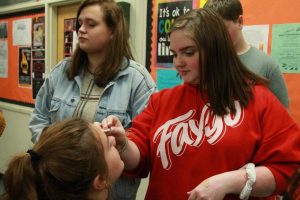
Nordin, who took over makeup this year, is pictured here checking foundations for the actors.
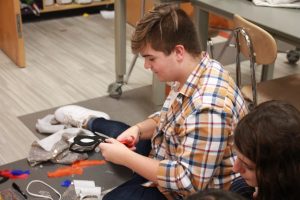
Droelle has been working on costumes for Utica since he was in eighth grade. He is seen here working on masks for the Halloween Dance in the play.
DOWN IN THE WINGS
Costume changes, makeup fixes, and props are all hidden from the audience backstage. Actors have little time between scenes to get ready for their next appearance. The technicians behind the curtains make sure everything goes smoothly.
Sophomore Jack Droelle leads the costume department for “Puffs”, meaning his team has to sketch and plan all of the outfits actors wear. Then, they have to label and store everything until the show is ready.
“We talk with the directors to make sure its all good and their vision is what our vision is, too, so we kind of combine their thoughts with ours,” Droelle said. “Then we order them and make them and make sure they all fit and then we try them on and run with them and it’s done.”
In order to be seen right on stage, every actors needs proper makeup – or else they will appear “washed out” according to junior Olivia Nordin, Makeup Director for “Puffs.” Each actor’s makeup must line up with their costumes, which is done through close work between the two departments.
“We discuss color coordination with the people on costumes and do a rough sketch of the makeup look. Then, we show the rough drafts to the directors and they give us feedback,” Nordin said. “Certain characters have features that signal who they are, so makeup forms and enhances the physical features on the face.”
Actors also need props while they’re on stage in order to understand the scenes. Those who organize these props for the show need to go through the script, mark each spot a prop might be needed, and then make a list of everything actors will use.
“The first thing I do is I read the whole script and then go back and use my laptop to carefully read one by one which props are needed,” senior Gabbi Hotaj said. “I helped bring in supplies for the wands, which was a lot of fun because you can get really creative with all the stuff you bring in.”
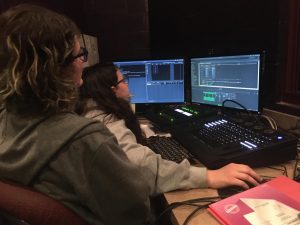
Amyx took over lights this year, after the previous Head graduated.
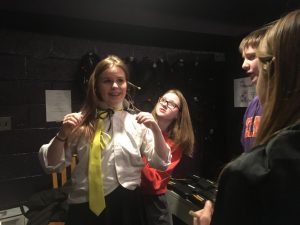
Senior Kayla Evans helps fix junior Reagan Ludwig’s microphone before rehearsal. The microphones are split into two parts – the pack, which is sends sound waves, and the headset, which receives the actor’s voice.
UP IN THE BOOTH
Senior Daniella Russo and junior Athena Amyx are in charge of the tech booth in the auditorium, leading the departments of sound and lights, respectively. They spend show times sitting behind the audience, ensuring the actors can be seen and heard.
Before a show can be performed, the stage lights must be reprogrammed and moved around. With close to 100 lights hanging above the stage, and all the ones above the audience, this can prove quite the task for those on light crew.
“The programming of the lights all depends on where actors go on stage and where the set is,” Amyx said. “It’s a shame the audience doesn’t know when [a light cue] was really perfect.”
Microphones are essential to the production – though they aren’t as noticeable as one may expect. The actors use head-worn microphones, so they lay on the cheek, near the mouth. Putting these on and removing them after the show can only be done by a few people, in order to make sure they aren’t damaged.
“Like most things, the better we take care of the microphones, the longer they last” Russo said. “When putting them away, we keep the headsets in cases. My crew and I carefully wrap the wires and place it in the case where it will not get bent or broken. We also have to warn the actors and ask them not to touch or bend the microphone when it is on their face.”
Though there isn’t too much they can work on with everyone rehearsing, they get their workload in during the week before the show – also known as Tech Week. During this week, actors run through the show while the lights are situated, and the microphones are messed with.
“What we have to do in Tech Week is program the cues which, is what lights will be on and when,” Amyx said. “When actors are on the stage it helps with making the cues because it allows me to see what lights need to be where.”






